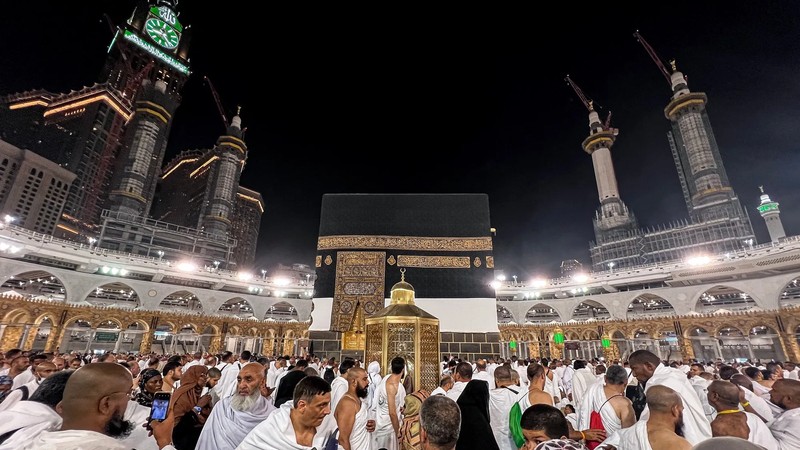Synopsis: “The annual Islamic pilgrimage of Hajj continues to evolve under Saudi Arabia’s Hajj modernisation efforts, emphasising pilgrim safety and comfort. While 2024’s extreme temperatures posed significant challenges, particularly affecting unauthorised pilgrims, the event highlights the crucial importance of official registration and proper facilities. The government is under increased pressure to enforce stricter regulations and enhance safety measures for future Hajj seasons.
Hajj is an undertaking which must be completed at least once in one’s lifetime for Muslims who are physically and financially capable. Completing the Islamic pilgrimage forms one of the five pillars of Islam and each year millions of Muslims worldwide travel to perform Hajj in Makkah (Mecca), Saudi Arabia. The 2024 Hajj took place between the 14th and the 19th of June seeing nearly 2 million Muslims from around the world taking part in the ceremonial rituals under extreme heat.
The Spiritual and Physical Challenge of Hajj
Annually, in the same time period in Dhul Hijjah- in the twelfth month of the Islamic Calendar, on the 8th day, Hajj will begin. It lasts about five to six days, depending on the moon’s sighting. The Islamic pilgrimage is a spiritual, physically challenging and emotional journey encouraging pilgrims to be patient and to have controlled temperament. To begin, the pilgrims gather in Makkah (Mecca) and perform a variety of rituals that are based on those completed by the Prophet Muhammad (S.A.W). In the past, hardship was expected and meant to be endured, Muslims would commence Islamic pilgrimage after having assigned a trusted member of their community or relative to be an executor of their will for a safe return if the journey was not successful.
Hajj Modernisation Under Saudi Rule
Under King Abdul Aziz Ibn Abdul Rahman Al-Saud, a former tribal and Muslim religious leader as well as the founder of the modern Kingdom of Saudi Arabia improved the circumstances surrounding Hajj such as implementing programs ensuring security and safety for pilgrims, including their comfort and well-being.
Tragic Deaths During the 2024 Hajj
Unfortunately, a beautiful commitment to one’s faith turned sour in June 2024 as 1 301 people have died during Hajj in the face of scorching hot temperatures, making it one of the deadliest in recent years. To darken matters, the Saudi Health Minister stated that 83% of fatalities were unauthorised pilgrims with no identification documents on many of those who passed. In response, the Egyptian government revoked the licences of 16 travel agencies that illegally facilitated travel for unauthorised pilgrims. As a result of the Saudi pilgrim quotas rules being discarded, the Egyptian Government attributed over 660 Egyptian deaths; 31 of them unauthorised. Cairo states that these travel agencies arranged pilgrims with ‘personal visit visas’ rather than ‘Hajj visas’ therefore the available facilities offered by Saudi officials to accommodate pilgrims amidst the 51.5 degrees Celsius weather remained inaccessible.
The Risks of Unauthorised Islamic Pilgrimage
Consequently, those who are unauthorised resort to walking through the desert to avoid being caught by Saudi authorities, and avoid the risk of arrest or deportation. This group of pilgrims account for over 80% of the reported deaths. The reason the unauthorised/ unregistered route is favoured by many is because of the great difficulty in acquiring the Hajj visa due to the lottery system and imposed quotas. The Saudi government has reinforced that only pilgrims with valid Hajj visas can access government-supported infrastructure, including emergency healthcare.
Why a Legal Hajj Visa is the Better Option
However, the benefits of abiding to the Saudi authorities regulations and cost of Hajj visas remain highly beneficial for pilgrims such as being entitled to medical treatment in Saudi hospitals, no risk of deportation, smooth and streamline immigration processes and transportation. This is by far a safer and more attractive offer with no risk of exhaustion, dehydration and offers a more peaceful and sacred Islamic pilgrimage for Muslims to enjoy their spiritual journey.
As Hajj 2025 approached, Saudi Arabian authorities and pilgrims alike must adapt to new challenges to ensure a safer and more organised spiritual experience for all through the incorporation of improved safety adjustments by Saudi Arabia such as enhanced emergency response services, location tracking and ensuring all attendees have access to proper resources.






